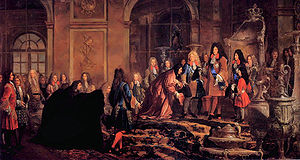
Bombardment of Genoa
Encyclopedia

War of the Reunions
The War of the Reunions was a short conflict between France and Spain and its allies. It was fueled by the long-running desire of Louis XIV to conquer new lands, many of them comprising part of the Spanish Netherlands, along France's northern and eastern borders...
when France bombarded the city of Genoa
Genoa
Genoa |Ligurian]] Zena ; Latin and, archaically, English Genua) is a city and an important seaport in northern Italy, the capital of the Province of Genoa and of the region of Liguria....
from the sea between May 18 and May 28 1684.
Background
The Republic of Genova, was a strategically very important ally of the Spanish EmpireSpanish Empire
The Spanish Empire comprised territories and colonies administered directly by Spain in Europe, in America, Africa, Asia and Oceania. It originated during the Age of Exploration and was therefore one of the first global empires. At the time of Habsburgs, Spain reached the peak of its world power....
, as the Spanish Duchy of Milan
Duchy of Milan
The Duchy of Milan , was created on the 1st of may 1395, when Gian Galeazzo Visconti, Lord of Milan, purchased a diploma for 100,000 Florins from King Wenceslaus. It was this diploma that installed, Gian Galeazzo as Duke of Milan and Count of Pavia...
was landlocked. All transport between Spain and Milan went over the port of Genoa. Furthermore, the financing of the Spanish crown by the Genovan bankers had made both countries natural allies ever since 1557, when the state bankruptcy of Philip II had ended the reign of the German Fuggers as Spanish financiers.
After the War of Devolution
War of Devolution
The War of Devolution saw Louis XIV's French armies overrun the Habsburg-controlled Spanish Netherlands and the Franche-Comté, but forced to give most of it back by a Triple Alliance of England, Sweden, and the Dutch Republic in the Treaty of Aix-la-Chapelle.-Background:Louis's claims to the...
and the Franco-Dutch War
Franco-Dutch War
The Franco-Dutch War, often called simply the Dutch War was a war fought by France, Sweden, the Bishopric of Münster, the Archbishopric of Cologne and England against the United Netherlands, which were later joined by the Austrian Habsburg lands, Brandenburg and Spain to form a quadruple alliance...
, it was clear that France had replaced Spain as the most powerful country in Europe. In October 1683 France annexed some territory in the Spanish Netherlands, starting the War of the Reunions
War of the Reunions
The War of the Reunions was a short conflict between France and Spain and its allies. It was fueled by the long-running desire of Louis XIV to conquer new lands, many of them comprising part of the Spanish Netherlands, along France's northern and eastern borders...
.
When Spain sent reinforcements via the port of Genoa, the French decided to punish the city.
Without a formal declaration of war, a French fleet commanded by Abraham Duquesne
Abraham Duquesne
Other topics that could fall under Duquesne can be found at Marquis Duquesne Abraham Duquesne, marquis du Bouchet was a French naval officer, who also saw service as an admiral in the Royal Swedish Navy. He was born in Dieppe, a seaport, in 1610, and was a Huguenot...
, bombarded the city of Genova between May 18 and May 22 1684. About 13,000 cannonballs were shot at the city in ten days with a pause at may 21th- 22th.
The bombardment was terrible for the city and all the Genoan people because was the first of the History (except the previous bombardment of Algers) in which was used explosive bombs altough of stone or iron.
The French tried to land troops at Albaro (as diversion) and Sampierdarena (as main attack) but they was defeated by Genoan troops and people by Polcevera valley. The objective was to punish the city and to set an example.
Consequences
The Doge of GenoaDoge of Genoa
The Republic of Genoa, in what is now northern Italy, was technically a communal republic in the early Middle Ages, although it was actually an oligarchy ruled by a small group of merchant families, from whom were selected the Doges of Genoa.- History :...
went to Versailles in 1685 to offer an official apology.
In 1682, François Pidou de Saint Olon
François Pidou de Saint Olon
François Pidou de Saint Olon was a French diplomat under Louis XIV.-Embassy to Genoa and Spain:In 1682, he was nominated as the first French resident envoy to the Republic of Genoa, following the Bombardment of Genoa...
became the first French resident envoy to the Republic of Genoa
Republic of Genoa
The Most Serene Republic of Genoa |Ligurian]]: Repúbrica de Zêna) was an independent state from 1005 to 1797 in Liguria on the northwestern Italian coast, as well as Corsica from 1347 to 1768, and numerous other territories throughout the Mediterranean....
, following the bombardment, he was actively involved in the bombardment: indeed he communicated precious information to the French about the defence of Genoa and the position of the batteries of guns, being practically a spy.
The Republic of Genoa came under French influence for the next 100 years, altough it remained independent and became neutral.
The Genoan banker and trader made new economic and finacial links with France indeed.

